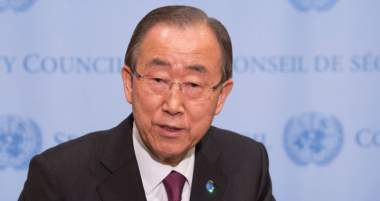Going Global
There was a time when the very notion of world government was taboo, at least in public. Although elites in the United States and every other Western nation have been working for decades to set up a world government, it was, until fairly recently, done behind the scenes, with plausible deniability. Those who dared to accuse the architects of the UN-centered international system as working to build global government were routinely derided as cranks and conspiracy theorists.
In recent years, however, the architects of world government have been more open about their goals. For example, current UN Secretary-General Ban Ki-moon (shown), at an October event in honor of the 70th anniversary of the UN’s founding, characterized the United Nations as the “parliament of humanity.”
Those who defend the notion of world government routinely claim that it would be a benign federation of nations structurally similar to our own federal government. Such a world government has long been promoted as the only possible solution to war and other social ills. Strip independent countries of their territorial sovereignty, it is claimed, and international war will cease. Who could possibly object to a benevolent “parliament of humanity” presiding over a future without war and without want?
Read More: Going Global

